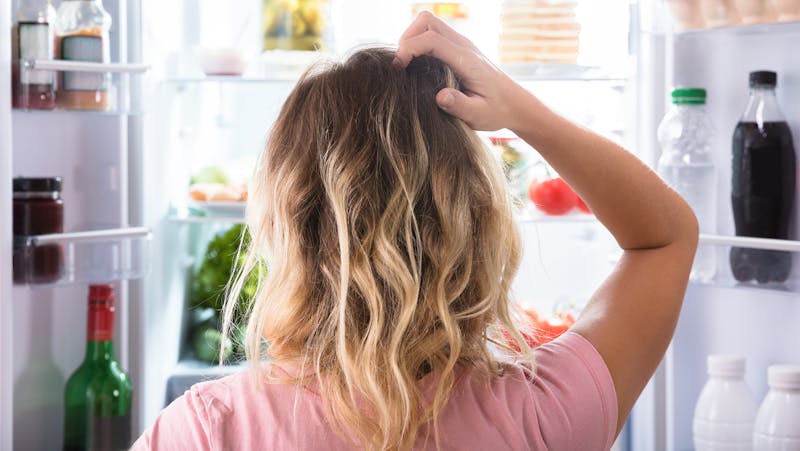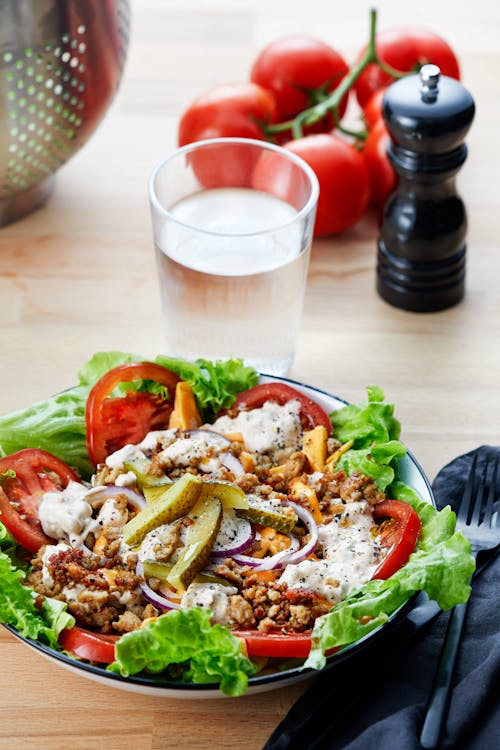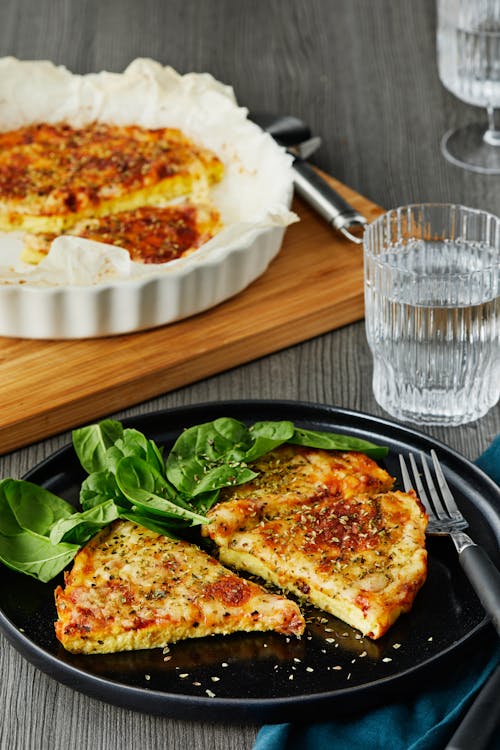GET STARTED KETO CHALLENGE
First step — prepare!
Congratulations! You’ve taken your first and most important step towards a healthier you. You’ve signed up for the 2-week keto challenge. Now let’s make this a great experience! Preparation is the key to success. Here you’ll find everything you need to really ace the next two weeks.
Prepare
Success favors the prepared. How to prepare? Do these two things:
Today: Get to know the challenge (15 minutes)
Sunday: Prep and start (2-3 hours)
Today:
Get to know the challenge
What do you need to know prior to diving into the challenge? These four things:
1. How to eat keto
A keto diet is about avoiding carbohydrates and replacing them with other, real foods — low-carb vegetables, proteins, and healthy fats. Another name for the keto diet is the low-carb, high-fat (LCHF) diet.
Not sure what has “carbs” and what does not? Don’t worry. In this challenge, we make it simple. We’ll tell you exactly what foods to get rid of and what foods to eat. We’ll supply you with meal plans, all the individual recipes needed, and the weekly shopping lists to make all those meals.
In fact, you’ll hardly need to think. Just follow the plan to stay under 20 grams of carbs per day. This is highly effective for weight loss and diabetes reversal.1
You’ll cook twice a day: a simple, fast breakfast and an equally easy dinner. Lunch will be leftovers from yesterday’s dinner that you just re-heat, saving you time. Win-win!2
Here are some sample recipes, click for a closer look:
Printing guide
Consider printing the meal plans, recipes, and ingredients lists if you want them available offline. Make sure to select the number of people you are shopping and cooking for, as the amounts will update accordingly.
Week 1: Overview
Week 2: Overview
2. Adjustments
Most people can do the keto challenge right away unless they have a specific health situation that requires more information or support. 3 These three situations may need additional planning or adjustments:
- Are you on medication for diabetes, e.g. insulin? Learn more
- Are you on medication for high blood pressure? Learn more
- Are you breastfeeding? Learn more
If you’re not in any of these groups, you’re ready to go. Keep reading!
3. Do tell!
Do you stay mum or broadcast your new diet to the world? We recommend at least telling the people you live with what you plan to do over the next two weeks. Their support will make it easier for you to succeed. Perhaps they may even join you? Here’s a very simple one-page document that you can hand out to explain what this is all about.
Good to know4. Schedule
Schedule 2-3 hours on Sunday afternoon for final preparations for the challenge. You’ll rid your kitchen of problem foods and then go shopping for exquisite low-carb ingredients that will nourish your body and inner foodie. Sounds like a plan?
Sunday
Final prep and start
It’s time! Today — Sunday — is the day you start changing your life. Good luck and enjoy!
If you follow all the preparations — the total time needed is about 2-3 hours — the upcoming week will be a breeze.
1. Clean-out

Get rid of (throw out or give away) all the high-carb temptations in your pantry, fridge and freezer. Doing so massively improves your chances of success. Here’s how you do it.
Does that sound too hard for you? Can you not imagine ridding yourself of some fave comfort foods? If so, you might benefit from watching our video course on sugar addiction.
2. Shop
It’s time to buy some great food!
The ingredients list contains all the food that you need for the entire first week of the challenge.
If you are allergic to something, have special dietary needs, or just want to eat something other than what we’ve planned for you, you can always choose any other keto meal that works for you.
If you’re not a member and want to switch a meal, you will have to do some additional shopping. It’s worth checking out our free membership trial to be able to customize the meal plans if needed. With customized meal plans the shopping lists will automatically adjust. However, the daily emails you will receive from the challenge won’t contain your hand-picked meals, because we are unable to read your minds — just yet!When using or printing the ingredients list, make sure you select the number of people you’re shopping for. Also, you can select US or metric measurements.
Of course, before going shopping, check your kitchen for what you already have to avoid buying duplicates of eggs, butter, spices, etc.
Here are two more handy items you may want to pick up today if you don’t already own them:
- Scale (for weighing yourself)
- Measuring tape
3. Measure
People start eating keto for different reasons. Usually they start because they want to lose weight. After they have been eating keto for a while they start to notice other health benefits as well. The most common ones are a calmer stomach, clearer skin, better mental focus and more energy.4
How will you know if you are experiencing significant improvements in the diet? It may help if you measure and note it. Consider getting a notebook or starting a file on your computer to document how you feel, what you weigh, what your measurements are.
We’re all different. The only person you will actually be able to compare yourself to is you. Some people lose a lot of weight on keto just after a couple of days and feel great while doing it. Some people don’t lose any weight at all during the first weeks and can even feel a bit poorly (keto flu). This might be because the body needs more time to adjust to using fat instead of sugar as fuel.5 You didn’t gain that weight in two weeks, right? So relax and give it some time to shed, too.
So, if you signed up for our keto challenge because you want to lose weight, you might want to track your progress. But if you get stressed out just by thinking about weighing yourself – don’t. There are different ways of tracking your progress. Do what feels right for you. First of all, you may feel it and see it in the mirror. Or maybe you’ve got a pair of favorite jeans that don’t fit you anymore? Try them on as a way of measuring your progress in a practical way without using a scale or notebook.
Remember, the most important thing is how you feel. By eating delicious and healthy whole foods, you will finally start providing your body with what it needs to heal. This is where self-love begins.
Here are some tips if you want to document your progress:
- Waist circumference — use a measuring tape around your waistline, just above your belly button.
- Take a full-body picture — ask a friend or take a selfie in the mirror.
- If you have any health issues, make a note of them, to see if they have improved after the challenge.
Continue to Monday week 1
Q&A
Do you have questions about this challenge? Check out the FAQ page.
Get started keto challenge – Prepare - the evidence
This guide is written by Dr. Andreas Eenfeldt, MD, Jill Wallentin, Dr. Bret Scher, MD and was last updated on June 17, 2022.
All our evidence-based health guides are written or reviewed by medical doctors who are experts on the topic. To stay unbiased we show no ads, sell no physical products, and take no money from the industry. We're fully funded by the people, via an optional membership. Most information at Diet Doctor is free forever.
Read more about our policies and work with evidence-based guides, nutritional controversies, our editorial team, and our medical review board.
Should you find any inaccuracy in this guide, please email andreas@dietdoctor.com.
PLOS ONE 2015: Dietary intervention for overweight and obese adults: comparison of low-carbohydrate and low-fat diets. A meta-analysis [strong evidence]
Diabetes Research and Clinical Practice 2018: Effect of dietary carbohydrate restriction on glycemic control in adults with diabetes: A systematic review and meta-analysis [strong evidence]
The idea that fewer carbs is more effective is mainly based on the consistent experience of experienced practitioners, and stories from people trying different levels of carb restriction [weak evidence]
The only intervention study – to our knowledge – that compared different levels of carb restriction was a small trial that found trends towards greater weight loss and greater improvements in cardiometabolic risk factors as carb intake went lower.
PeerJ 2019: Low-carbohydrate diets differing in carbohydrate restriction improve cardiometabolic and anthropometric markers in healthy adults: a randomised clinical trial [moderate evidence]
The lower your carb intake, the more it appears that your glycemic (blood sugar) control improves:
Journal of the American Dietetic Association 2008: Restricted-carbohydrate diets in patients with type 2 diabetes: a meta-analysis [moderate evidence, downgraded as it’s comparing effects between different low-carb trials. There is no RCT comparing low carb to lower carb.]
↩Do you worry about saturated fat or cholesterol in foods like eggs and bacon? There’s no good reason to do so. While still a bit controversial, several modern systematic reviews find no benefit from avoiding saturated fats, or replacing them with unsaturated fats:
Open Heart 2016: Evidence from randomised controlled trials does not support current dietary fat guidelines: a systematic review and meta-analysis [strong evidence]
Learn more:
The main fear about lower-carb and higher-fat diets has always been an increase in the risk of heart disease. However, interventional studies so far indicate that if anything the risk appears to decrease:
British Journal of Nutrition 2016: Effects of low-carbohydrate diets v. low-fat diets on body weight and cardiovascular risk factors: a meta-analysis of randomised controlled trials. [strong evidence for improved risk factors] ↩
On a keto diet, a calmer stomach, less gas, less cramps and pains, and improvements in IBS symptoms are a common experience in clinical practice. [weak evidence]
This small non-randomized intervention trial found promising effects:
Clinical Gastroenterology and Hepatology 2009: A very low-carbohydrate diet improves symptoms and quality of life in diarrhea-predominant irritable bowel syndrome [weak evidence]
A low-carb diet is generally a low FODMAP diet, and the latter has stronger scientific support for improving IBS symptoms:
Journal of Gastroenterology and Hepatology 2017: The evidence base for efficacy of the low FODMAP diet in irritable bowel syndrome: is it ready for prime time as a first-line therapy? [moderate evidence]
A keto diet may result in less acne:
American Journal of Clinical Nutrition 2007: A low-glycemic-load diet improves symptoms in acne vulgaris patients: a randomized controlled trial [moderate evidence]
This review article discusses the theory and the science behind this potential effect:
Skin Pharmacology and Physiology 2012: Nutrition and acne: therapeutic potential of ketogenic diets
Increased mental performance and more energy are commonly reported experiences from people who have tried a ketogenic diet. Learn more [very weak evidence]
There’s limited scientific support:
Appetite 2009: Low-carbohydrate weight-loss diets. Effects on cognition and mood [weak evidence]
↩Clinical observation suggests that keto-adaptation probably takes 2 to 4 weeks:
The American Journal of Clinical Nutrition 2007: Low-carbohydrate nutrition and metabolism [overview article] ↩


